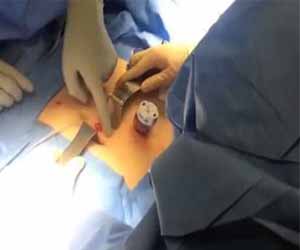- Home
- Editorial
- News
- Practice Guidelines
- Anesthesiology Guidelines
- Cancer Guidelines
- Cardiac Sciences Guidelines
- Critical Care Guidelines
- Dentistry Guidelines
- Dermatology Guidelines
- Diabetes and Endo Guidelines
- Diagnostics Guidelines
- ENT Guidelines
- Featured Practice Guidelines
- Gastroenterology Guidelines
- Geriatrics Guidelines
- Medicine Guidelines
- Nephrology Guidelines
- Neurosciences Guidelines
- Obs and Gynae Guidelines
- Ophthalmology Guidelines
- Orthopaedics Guidelines
- Paediatrics Guidelines
- Psychiatry Guidelines
- Pulmonology Guidelines
- Radiology Guidelines
- Surgery Guidelines
- Urology Guidelines
Gastric electrical stimulation significantly improves gastroparesis symptoms

USA: Putting an end to long-run controversies on whether gastric electrical stimulation (GES) can be used for the treatment of gastroparesis symptoms, a recent study has found GES to be beneficial for improving gastroparesis symptoms in gastroparesis patients. The study is published in the journal Neurogastroenterology & Motility.
The multicenter study of gastroparesis patients found significant improvements in the GCSI, and nausea, retching, and vomiting severity in patients receiving GES versus patients not receiving GES.
Gastroparesis is a condition affecting the normal spontaneous movement of the muscles (motility) in the stomach. Signs and symptoms include weight loss, abdominal pain, lack of appetite, abdominal bloating vomiting, nausea, a feeling of fullness, and acid reflux.
According to the study, GES has been approved as a Humanitarian Use Device (HUD) in the US since 2000 for the treatment of gastroparesis of diabetic or idiopathic origin and has been used in several thousand patients. But despite its HUD approval, the use of GES has been controversial and the data, including controlled trials, have been the source of much debate.
Thomas L. Abell, University of Louisville, Louisville, Kentucky, and colleagues studied 319 idiopathic or diabetic gastroparesis symptom patients from the Gastroparesis Clinical Research Consortium (GpCRC) observational studies: 238 without GES and 81 with GES. They assessed the effects of GES using change in GCSI total score and nausea/vomiting subscales between baseline and 48 weeks. Propensity score methods were used to control for imbalances in patient characteristics between comparison groups.
Key findings of the study include:
- GES patients were clinically worse (40% severe vs. 18% for non‐GES); worse PAGI‐QOL (2.2. vs. 2.6); and worse GCSI total scores (3.5 vs. 2.8).
- We observed improvements in 48‐week GCSI total scores for GES vs. non‐GES: improvement by ≥ 1‐point (RR = 1.63) and change from enrollment (difference = −0.5).
- When adjusting for patient characteristics, symptom scores were smaller and not statistically significant: improvement by ≥ 1‐point (RR = 1.29) and change from the enrollment (difference = −0.3).
- Of the individual items, nausea improved by ≥ 1 point (RR = 1.31). Patients with GCSI score ≥ 3.0 tended to improve more than those with a score < 3.0.
"This multicenter study of gastroparesis patients found significant improvements in gastroparesis symptoms among GES patients. Accounting for imbalances in patient characteristics, only nausea remained significant. Patients with greater symptoms at baseline improved more after GES," wrote the authors.
"A much larger sample of patients is needed to fully evaluate symptomatic responses and to identify patients likely to respond to GES," they concluded.
More Information: "Effectiveness of gastric electrical stimulation in gastroparesis: Results from a large prospectively collected database of national gastroparesis registries" published in the journal Neurogastroenterology & Motility.
DOI: https://doi.org/10.1111/nmo.13714
Journal Information: Neurogastroenterology & Motility

Disclaimer: This site is primarily intended for healthcare professionals. Any content/information on this website does not replace the advice of medical and/or health professionals and should not be construed as medical/diagnostic advice/endorsement or prescription. Use of this site is subject to our terms of use, privacy policy, advertisement policy. © 2020 Minerva Medical Treatment Pvt Ltd